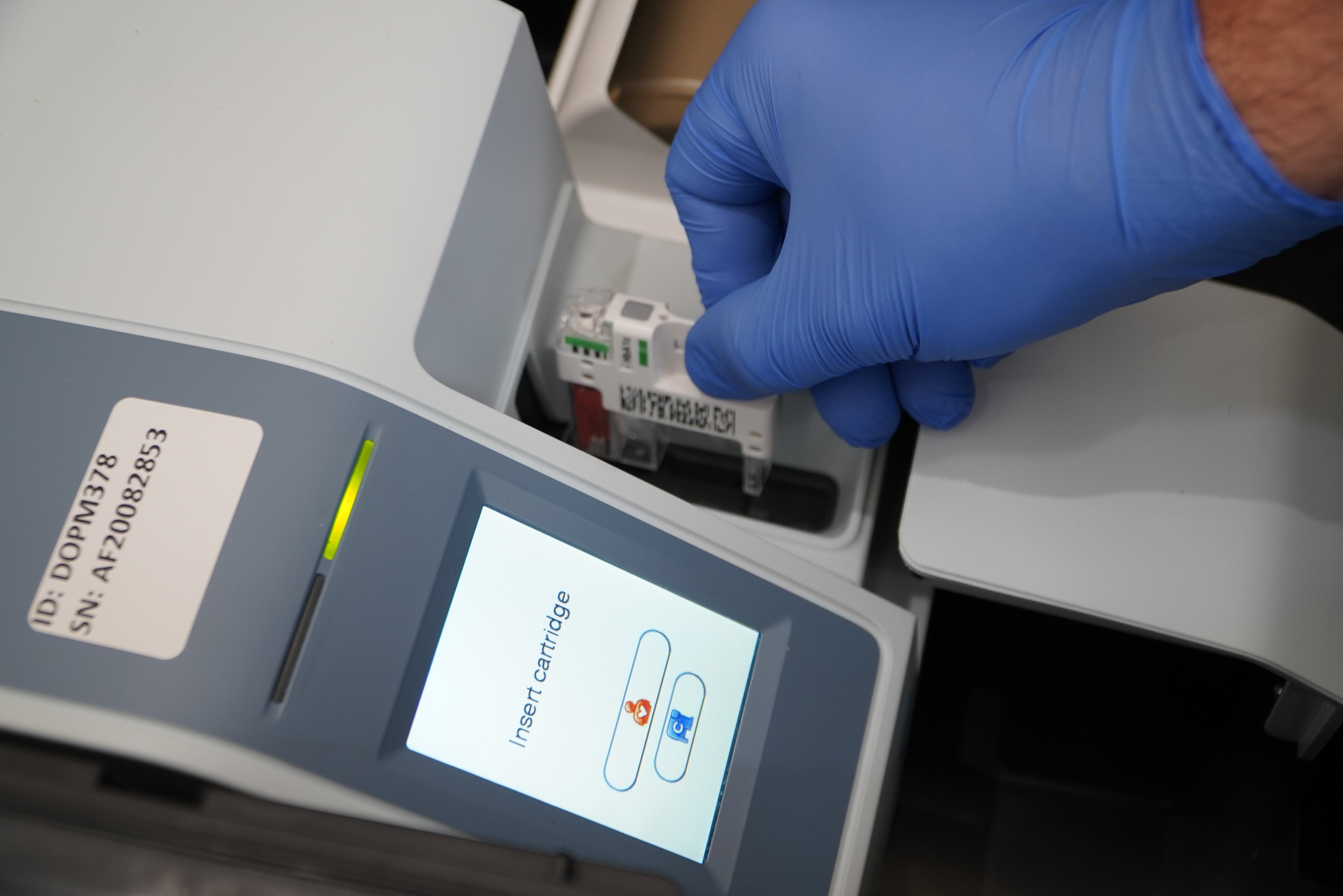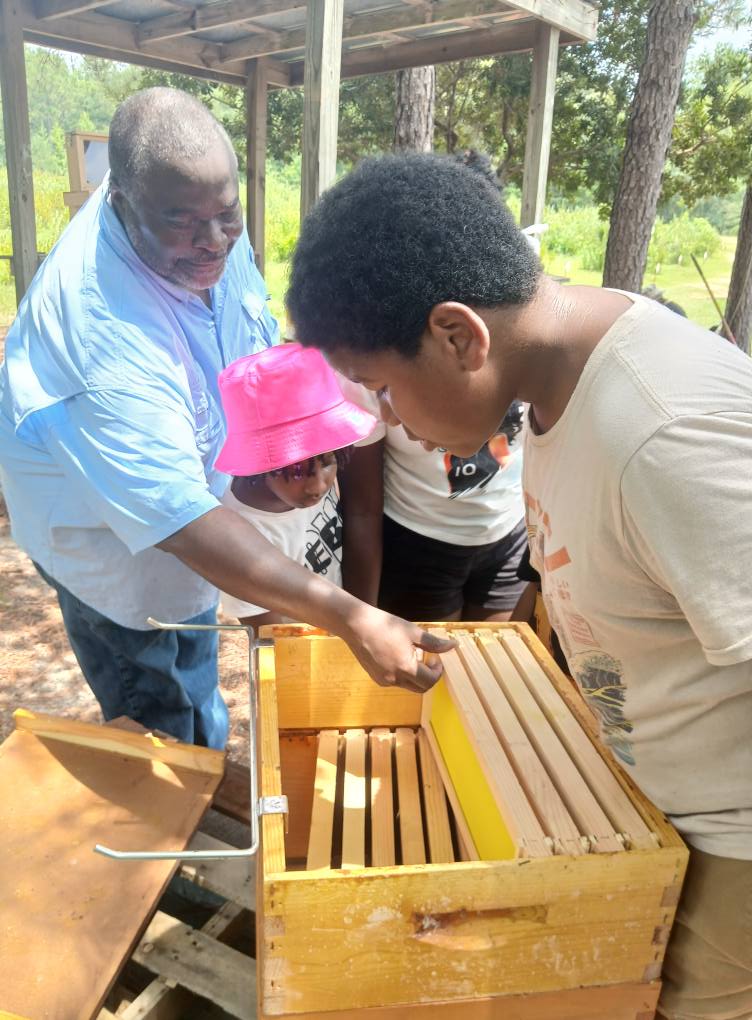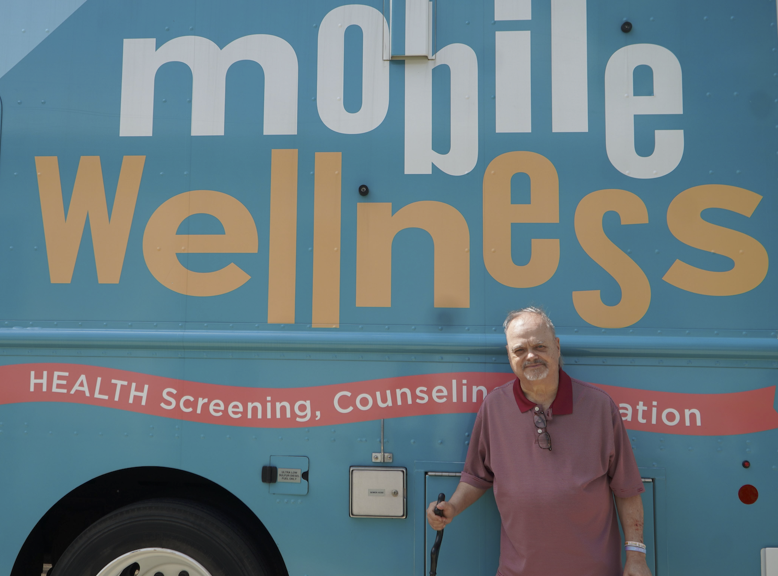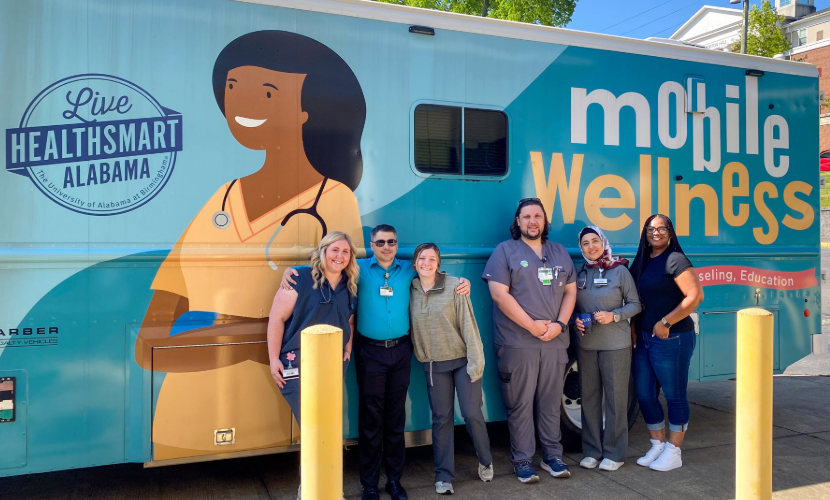
The UAB Department of Family and Community Medicine has officially integrated its Cahaba-UAB Highlands Family Medicine Residency Track rotations with Live HealthSmart Alabama’s (LHSA) Mobile Wellness program.
Live HealthSmart Alabama (LHSA) is upgrading its Mobile Wellness capabilities with a new tool that makes diabetes testing faster, easier, and more reliable.
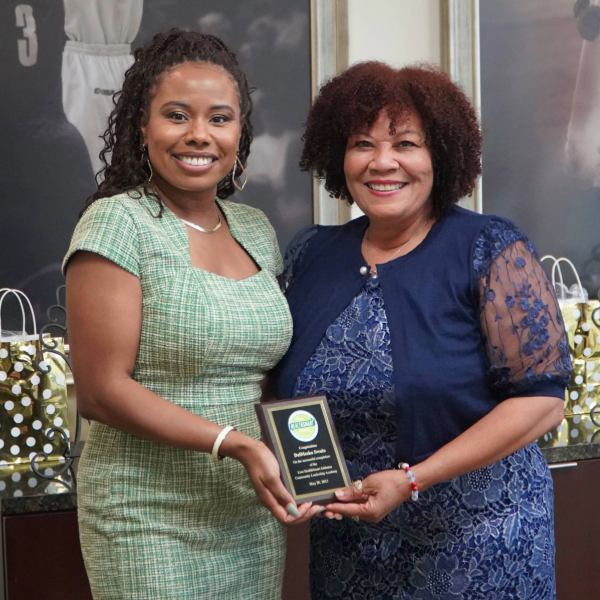
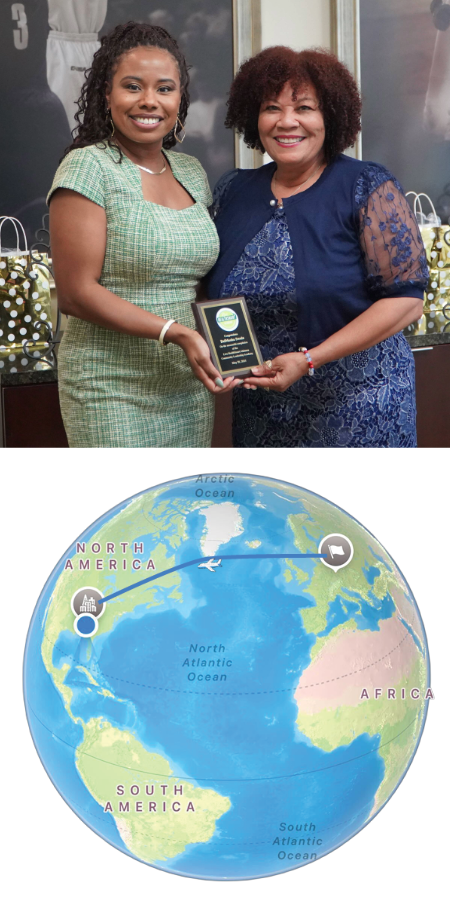 When DelMesha Swain applied to the Community Leadership Academy (CLA)— a leadership development program created by Live HealthSmart Alabama in partnership with Coca-Cola Bottling Company UNITED—she was living thousands of miles away in the Czech Republic. After more than 15 years abroad, working in places like Oman and Prague, she was preparing to return to her hometown of Anniston, Alabama.
When DelMesha Swain applied to the Community Leadership Academy (CLA)— a leadership development program created by Live HealthSmart Alabama in partnership with Coca-Cola Bottling Company UNITED—she was living thousands of miles away in the Czech Republic. After more than 15 years abroad, working in places like Oman and Prague, she was preparing to return to her hometown of Anniston, Alabama.
During her time overseas, Swain often found ways to support children with special needs, but she felt a pull back to the community where she was raised. With her mother now in her 90s and a deep desire to continue making an impact at home, she knew it was time to return and revive her nonprofit, CLICK (Children Lifted Innovatively and Creatively through Knowledge)—which empowers people to build confidence and create lasting change in their lives and communities.
While planning her return, Swain began searching online for new opportunities and ideas. During one of those searches, she came across the Community Leadership Academy and was intrigued enough to explore Live HealthSmart Alabama’s website and social media.
“I was looking at opportunities to get reestablished in the community,” she recalled. “When I saw the Academy, I thought, ‘this will reignite me. As soon as I get back, I can just keep going.’”
Swain was accepted into Cohort 3 of the CLA and, over the course of seven sessions, was provided with tools for public speaking, team building, conflict resolution, and effective communication. As participants in the Academy, Swain and her cohort members also identified pressing issues in their communities, focusing on nutrition, wellness, education, or physical activity, and presented an actionable plan to address it.
For Swain, the timing couldn’t have been better. The CLA offered her not just professional training but a reset on how she approached leadership itself.
One of her biggest takeaways was learning to be comfortable asking for support.
“I really had a hard time with that,” Swain admitted. “I used to just put in my own money or take on things I knew I could handle, because I felt prideful about asking for help. But as you grow, you learn that there’s an asking part of it. When someone gives to CLICK, they’re not just giving to me; they’re helping the organization touch more lives. Realizing that I do need help, that was something I learned, and I’m still learning.”
From classroom to community garden
During her time in the CLA, Swain focused on food access in Anniston, a city she remembers once being full of neighborhood grocery stores but is now marked by food deserts and environmental challenges.
“I realized it’s not only about the food and about eating healthy, it’s about community,” she said.
That realization evolved into a neighborhood garden, founded by Swain, with the intention of bringing people together around healthy living. Visitors can expect a warm welcome, fresh produce, and creative spaces—including Zen and pollinator gardens.
“I want people to realize it’s a place to connect with nature,” she explained. “Every time we put our hands in the soil, we’re connecting with something that feeds our bodies and our souls.”
The garden also became an extension of CLICK’s educational mission. Swain began discussing “brain foods” with local children at school lunches, encouraging them to see the connection between nutrition and learning.
“Now they come running in, ‘Miss Del, I had brain food today!’” she said. “I can tell they’re thinking about it all day, and that makes a difference.”
That spark led to CLICK’s Garden Ambassador Program, where children help care for the garden, and AgriTech Next, a new initiative combining agriculture and technology.
“Kids need to see that technology is more than their phones,” Swain said. “It’s in farming, it’s in food systems, it’s in health. When they realize that, their whole perspective opens up.”
Lasting impact
Looking back, Swain credits the CLA with giving her the confidence and skills to bring these projects to life.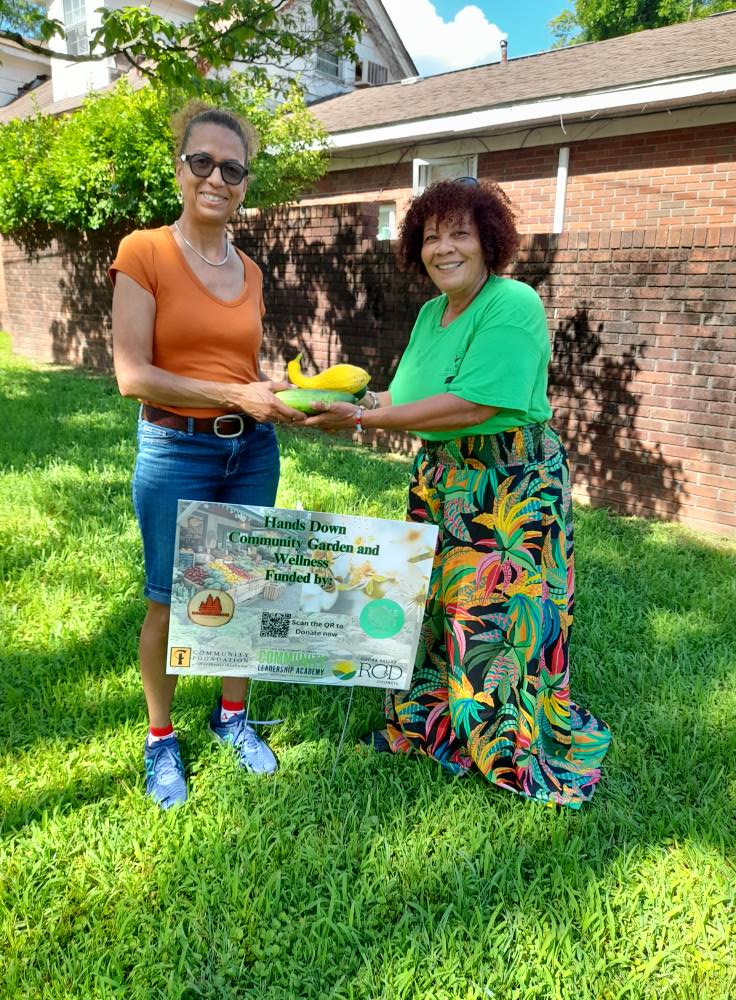
“As a leader, I used to feel like everything depended on me, that I had to deliver it all,” she said. “Now I know it’s about reaching out, asking, and connecting the community. That’s what really makes the difference.”
Her advice to future participants is simple: “Anyone who’s thinking about joining the CLA, don’t think about it, just do it. At my age, I didn’t think I could acquire much more information, but they presented it in such a way that you’re engaged, you’re involved, and you’re learning. And when we learn, then we can share.”
Through her journey, Swain has shown how Live HealthSmart Alabama empowers local leaders to bring about lasting change in their communities, whether through classrooms, community gardens, or conversations that remind children they have the power to grow strong and thrive.
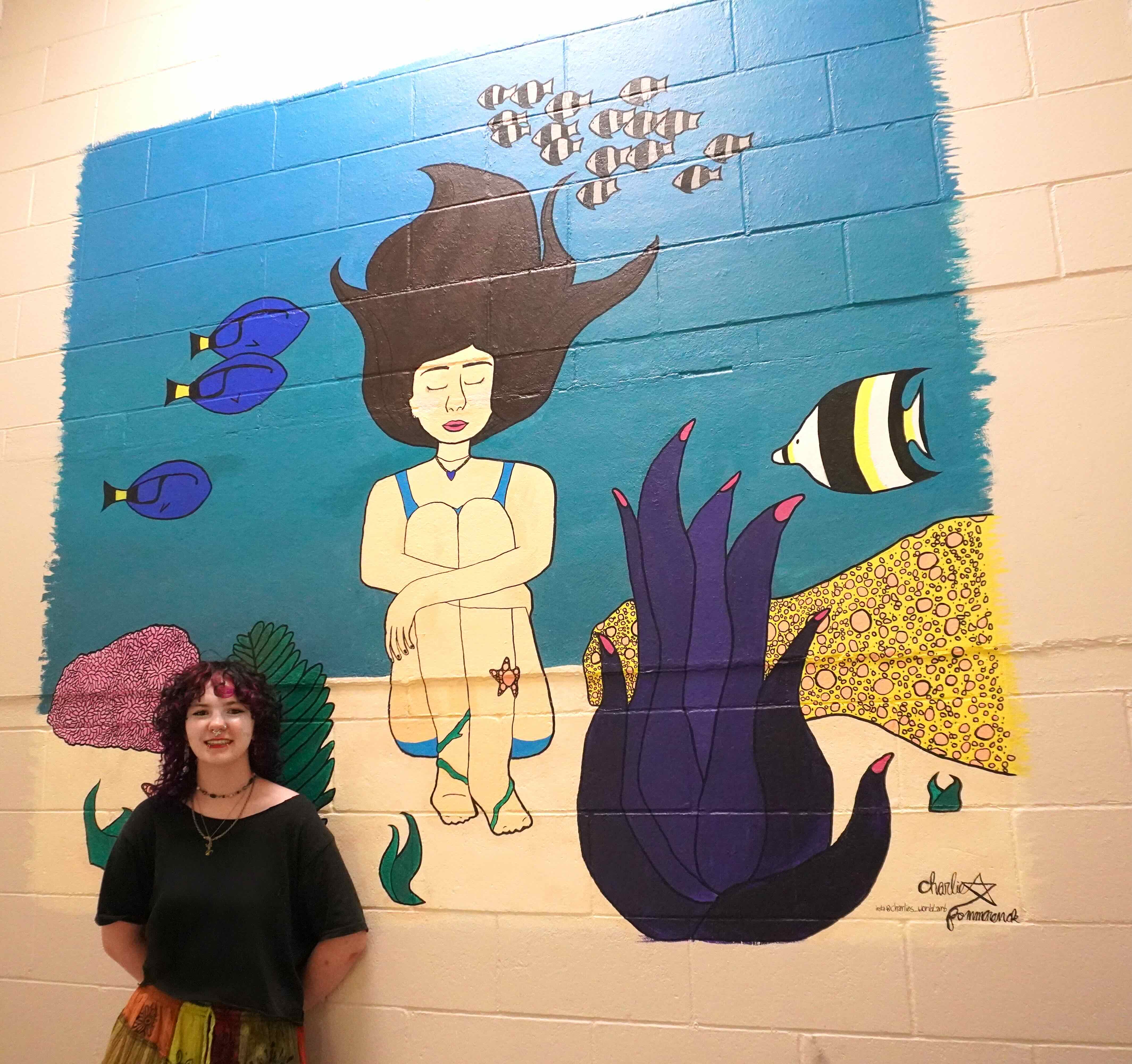 When UAB sophomore Charlie Pommerenck submitted her artwork for a mural contest she wasn’t expecting to be selected or aiming for perfection. She just wanted her design to be honest.
When UAB sophomore Charlie Pommerenck submitted her artwork for a mural contest she wasn’t expecting to be selected or aiming for perfection. She just wanted her design to be honest.
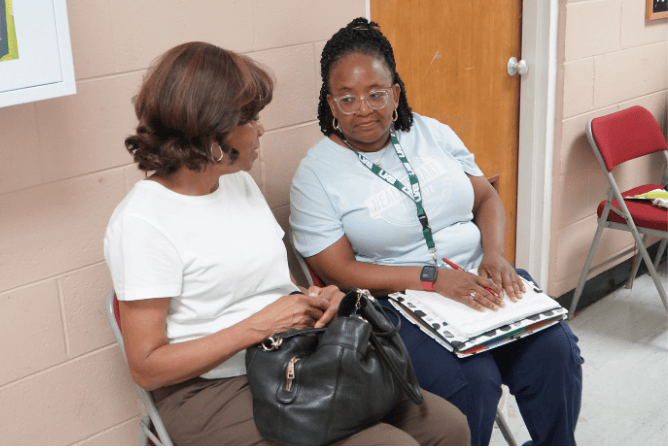
The University of Alabama at Birmingham’s Live HealthSmart Alabama (LHSA) initiative has been awarded a three-year grant from the Mike and Gillian Goodrich Foundation to expand its Community Coach team in Selma and the Dallas County area. The funding will allow LHSA to support the hiring, training, and deployment of additional Community Coaches.

 As a public health major nearing graduation, Lily Wachtel has spent her final semesters at the University of Alabama at Birmingham, not only studying community health challenges but actively working to address them.
As a public health major nearing graduation, Lily Wachtel has spent her final semesters at the University of Alabama at Birmingham, not only studying community health challenges but actively working to address them.
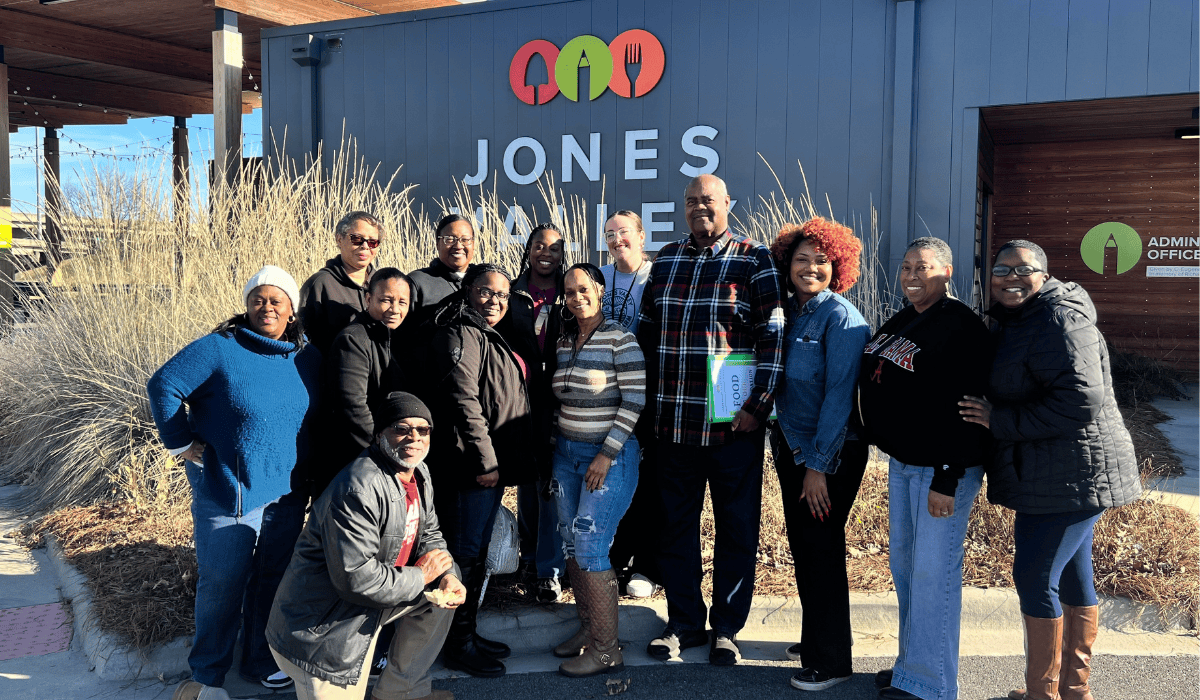
At Sophia P. Kingston Elementary in Selma, a new kind of classroom is coming to life: one that starts with a seed, thrives in the soil, and grows through the hands of educators.
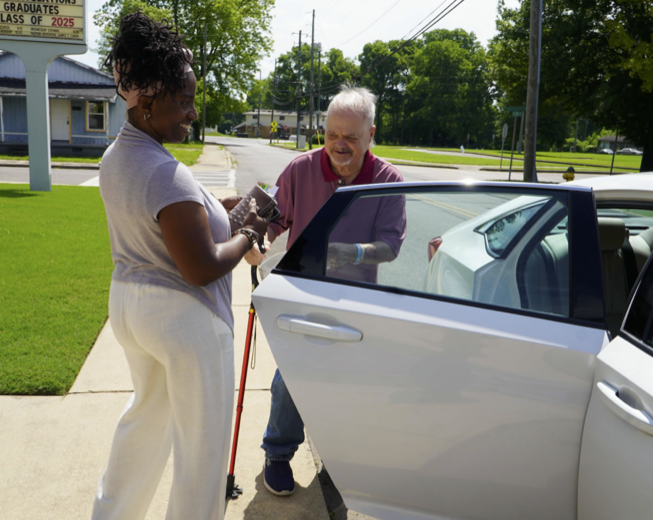
At 71, Ron Collins is navigating life with chronic illness and limited mobility, but, thanks to support from Live HealthSmart Alabama (LHSA) and its Uber Health partnership, he’s regaining control over his health – and his life.


For most college students, spring break is a time to rest and recharge after a semester of hard work. For Howard University sophomore Milania Maurice, it was a chance to do something meaningful.
Rather than heading home or relaxing on a beach, Maurice traveled from Washington, D.C., to Birmingham to spend her spring break volunteering with Live HealthSmart Alabama’s (LHSA) Mobile Market.
She spent the week helping to bring fresh fruits and vegetables to neighborhoods across Birmingham and ultimately found new inspiration for her future career in health care.
Maurice’s passion for health and nutrition
At Howard, Maurice is majoring in Health Science with double minors in Biology and Chemistry, on a pre-dental track. She is passionate about health care, nutrition, and building stronger communities — passions deeply rooted in her upbringing in New Jersey and strengthened by her experiences at Howard.
“Growing up, I witnessed how limited access to nutritious food and health care resources shaped the lives of those around me,” said Maurice. “That fueled my passion to advocate for equity and holistic wellness in underserved communities.”
“After researching the area, and when it came time to select an initiative and its corresponding service sites, I knew I wanted to focus on education and food stability. This became something I’m deeply passionate about, not only because of my personal experiences, but also because I believe addressing these needs is essential for building healthier, more empowered communities."
Since 1994, Howard University’s Alternative Spring Break Program has sent students to communities across the country to volunteer their time and gain a deeper understanding of underlying community needs This year, the program sent more than 1,300 students to serve in over 20 cities, including Birmingham, Alabama.
Maurice was originally set to volunteer at the Community Kitchens of Birmingham. Wanting to explore additional service opportunities in the area, Maurice came across Live HealthSmart Alabama’s website. She reached out to Kimberly Speights, executive director of the Community Kitchens and former LHSA team member. Speights helped connect Maurice with the LHSA team about volunteering. Reflecting on her decision to work with LHSA, Maurice explained that partnering with the organization allowed her team to “understand the importance of nutrition and food accessibility in a more equitable and sustainable way.”
After driving over 11 hours, she and her fellow Alternative Spring Break Program classmates settled into the SpringHill Suites at UAB, preparing for a week of service.
Although much of Maurice’s time was centered around LHSA’s Mobile Market, she and her peers spent their mornings mentoring students at local high schools, offering advice and encouragement to the next generation.
In the afternoons, she joined LHSA’s Mobile Market, a grocery store on wheels that stops in different communities across the city where residents can shop for fresh fruits, vegetables, and pantry staples t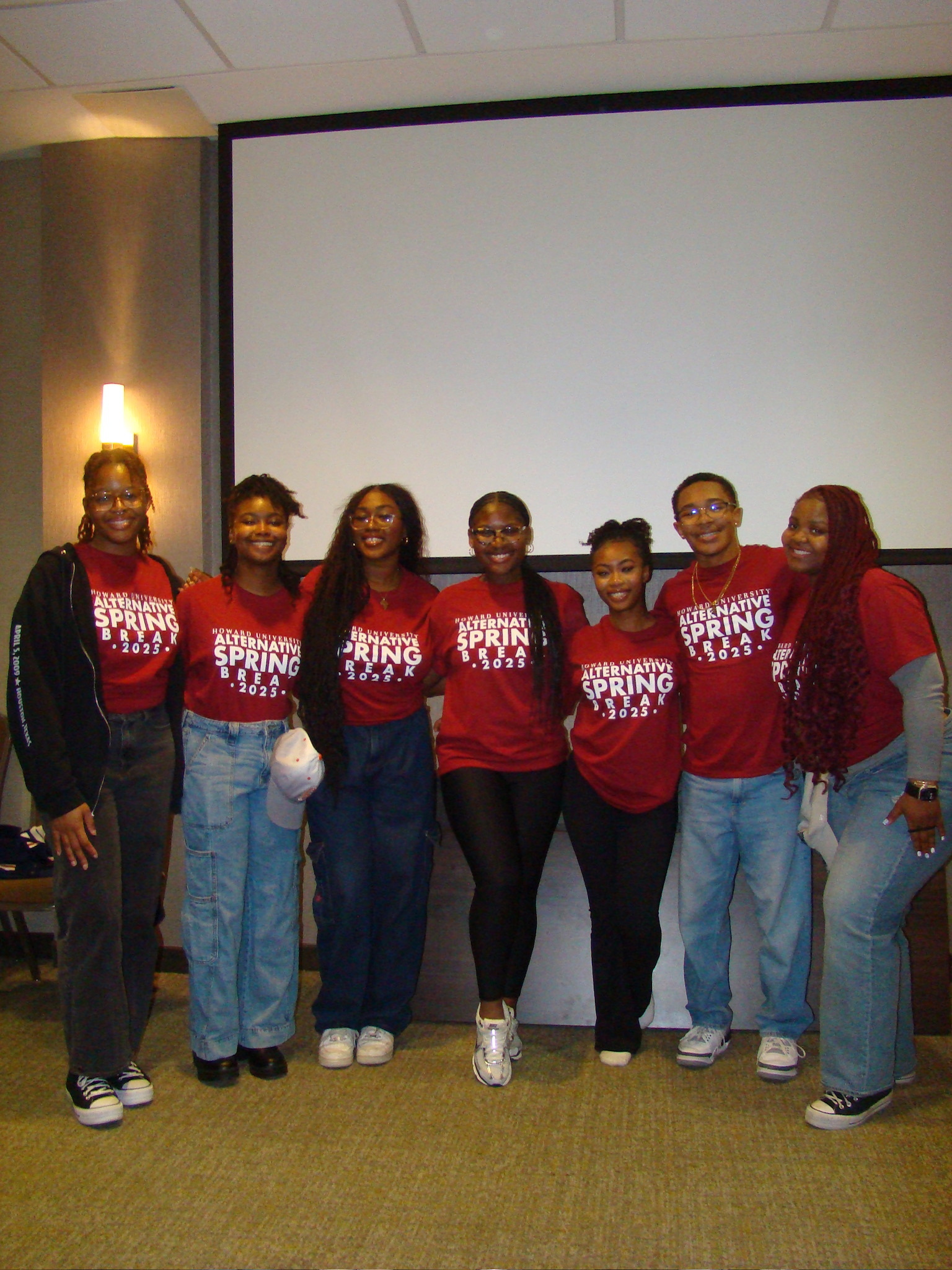
Despite her limited experience with the Mobile Market, Maurice quickly stepped into a leadership role at their service stop that week: a senior citizen community.
Trina Holmes, LHSA Community Engagement Manager, who worked closely with Maurice during her volunteer week, said, “Milania stood out for her leadership, while she excelled at delegating responsibilities, she also maintained clear and effective communication with both her teammates and me as they supported the Mobile Market and wellness initiatives.”
“It’s inspiring to see such self-driven, well-rounded individuals who genuinely want to make a difference. Thanks to her efforts, we received an outpouring of gratitude and heartfelt appreciation from the residents at Faush Manor. I’m excited to continue this partnership and look forward to welcoming more bright, motivated students in the future,” added Holmes.
Through programs like the Mobile Market, LHSA works to make good health simple for all Alabamians, focusing on good nutrition, physical activity, prevention and wellness, and education, a mission that resonates deeply with Maurice.
While volunteering, Maurice saw firsthand how important accessibility can be. "It was amazing," she said. "The truck would open up, people would grab their groceries, and you could just see how impactful accessing food could be."
Maurice’s passion for service
The week also offered opportunities for personal growth. As a future dentist, Maurice knows leadership and communication are essential skills. By stepping up and leading a team during her volunteer work, she strengthened both.
"This experience reminded me that health care isn’t just about treatment,” she said. “It's about building trust, communicating, and uplifting people."
One moment that stood out to her was meeting a man celebrating his 70th birthday at the Mobile Market. His words of gratitude, appreciating volunteers like herself, left a lasting impression.
"I’m just smiling thinking about it," she said. "It was such a reminder of why we do this work."
Although this was her first time visiting Alabama, Maurice said she would absolutely return to volunteer again, noting that the southern hospitality she experienced here is something she’ll never forget.
Outside of their service projects, Maurice and her team also visited historic sites such as the Birmingham Civil Rights Institute, the A.G. Gaston Motel, and the 16th Street Baptist Church, which gave them a deeper understanding of Birmingham’s legacy.
Reflecting on the week, Maurice said the experience helped sharpen her sense of purpose – a commitment to health care, a desire to lead, and a belief in the power of service.
Interested in becoming a volunteer? Learn more about Live HealthSmart Alabama here.
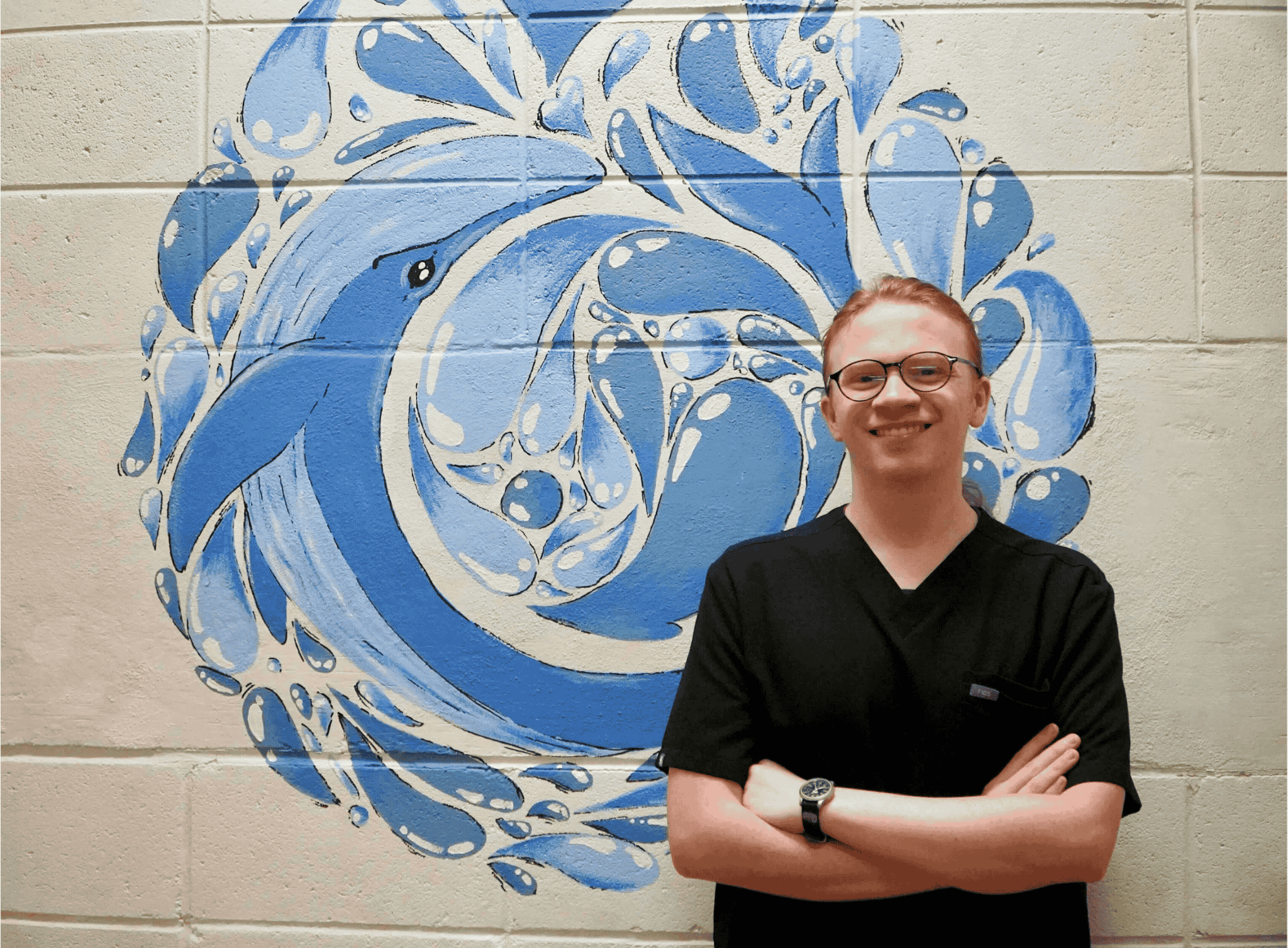
The University of Alabama at Birmingham’s (UAB) School of Nursing has a new mural by Rocky Kimble, a senior studying Biomedical Sciences at the university. This mural is the fourth installation in the Live HealthSmart Alabama (LHSA) Stairway to Wellness project, which aims to commission murals in stairwells across the university.
Led by Holly Wyatt, M.D., and Michele Gould, MPH, Stairway to Wellness promotes physical activity, good nutrition, education, and prevention across UAB by turning regular stairwells into visually inspiring spaces to encourage movement and well-being. Additional murals are featured in the Susan Mott Webb Nutrition Sciences Building and the School of Education and Human Sciences Building, with Kimble’s piece continuing the series as the latest installation. The project aims to complete 11 murals in stairwells across the university.
K imble’s mural, “Hydrostatic,” depicts a whale intertwined with drops of water. His inspiration for the piece came from themes of positivity, animals, and how consuming water and maintaining a healthy lifestyle promote longevity.
imble’s mural, “Hydrostatic,” depicts a whale intertwined with drops of water. His inspiration for the piece came from themes of positivity, animals, and how consuming water and maintaining a healthy lifestyle promote longevity.
“The blue whale is the mural's centerpiece,” said Kimble. “They’re incredibly long-lived, living up to 90 years. It felt like a really good central theme for the piece.”
Although Kimble is pursuing a degree in Biomedical Sciences, art—whether woodworking, drawing, or cooking—has always been a creative outlet for him.
When Kimble received an email from the Honors College seeking artists, he was immediately interested. Not only was this a unique chance for Kimble to flex his creative muscles, but it was also particularly special knowing that the piece would be displayed in the School of Nursing building, where his brother graduated.
Drawing on the walls isn’t new to Kimble; in fact, it’s something he has done since childhood.
“If I found a crayon or a Sharpie, I would draw on the walls, which made my mom a little mad,” said Kimble. “I find it funny how everything came full circle, and 15 years later, I’m being asked to draw on the walls.”
After talking with his brother and gaining insight into what nursing students might want to see, he began designing the piece.
Inspired by the poet Jalal ad-Din Muhammad ar-Rumi’s quote, “You are not a drop in the ocean. You are the entire ocean in a drop,” Kimble settled on a whale encompassed in a drop of water. To symbolize balance, he incorporated a yin-yang design, shaping the water droplets accordingly at the center of the mural.
To symbolize balance, he incorporated a yin-yang design, shaping the water droplets accordingly at the center of the mural.
Finally, “Hydrostatic” was complete.
“The name Hydrostatic was a little arbitrary in the beginning,” said Kimble. “It came from my science classes, where hydrostatic pressure is very important for things like maintaining the pressure in your blood. It felt very fitting for this piece because hydrostatic pressure is about maintaining a healthy balance of all that is essential for the health of your body and heart.”
For Kimble, the mural is more than just a piece of art—it’s a way to merge his love for science and art in a meaningful space. With his brother having graduated from the School of Nursing, the “Hydrostatic” mural feels like a personal tribute, now serving as a daily reminder of balance and well-being for all who pass by.
Interested in creating a mural on campus? Submit your request here.
- “Live HealthSmart Alabama is an Opportunity Where Competitors Become Collaborators”: How UAB and Community Partners Drive Change
- Building a Healthier Selma: Live HealthSmart Alabama Celebrates Improvements With A Ribbon Cutting
- Live HealthSmart Alabama initiative expands to Selma, building on Birmingham momentum and decades of experience
- Community Health Coaches Help LHSA Build Bridges to Better Health
